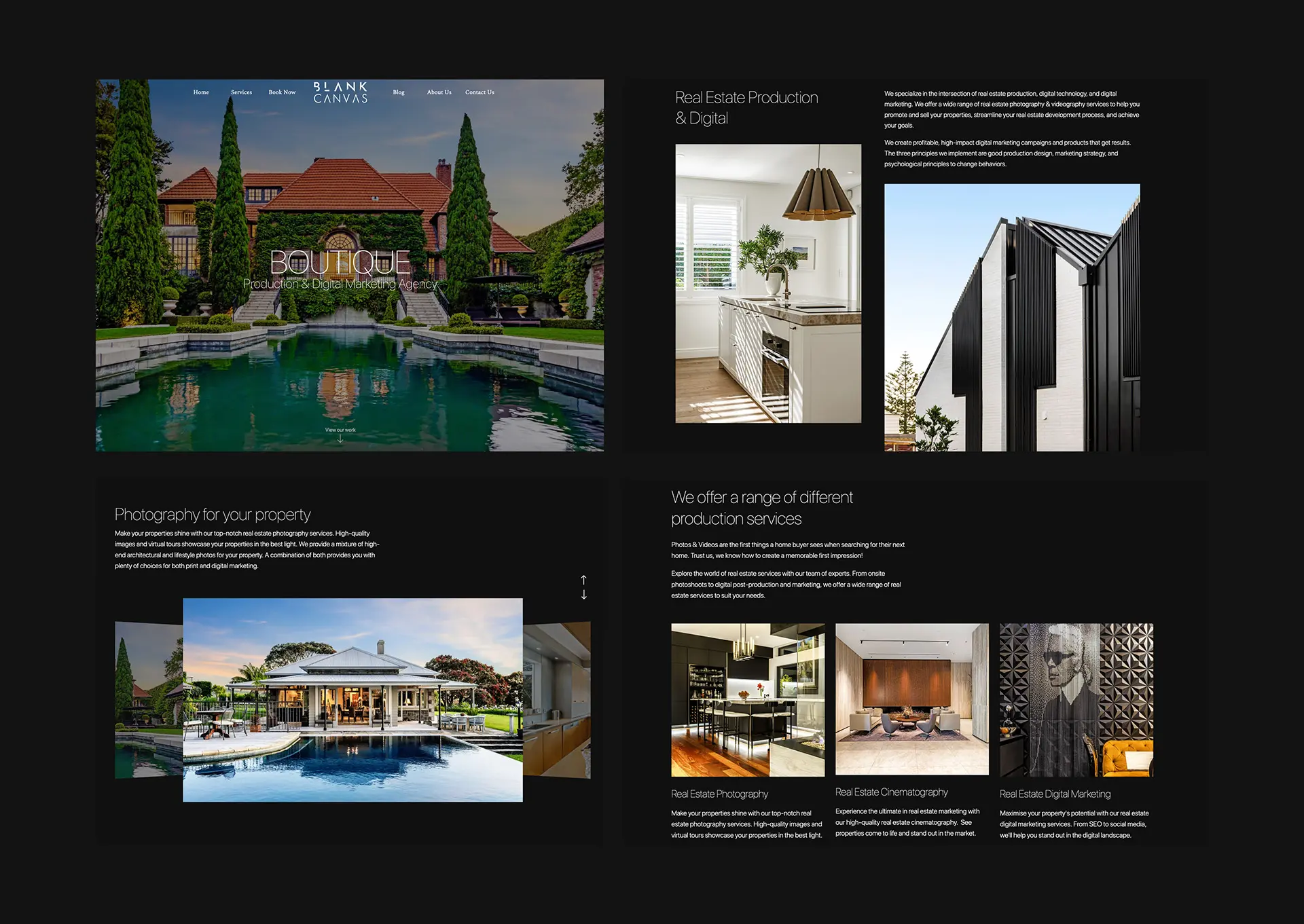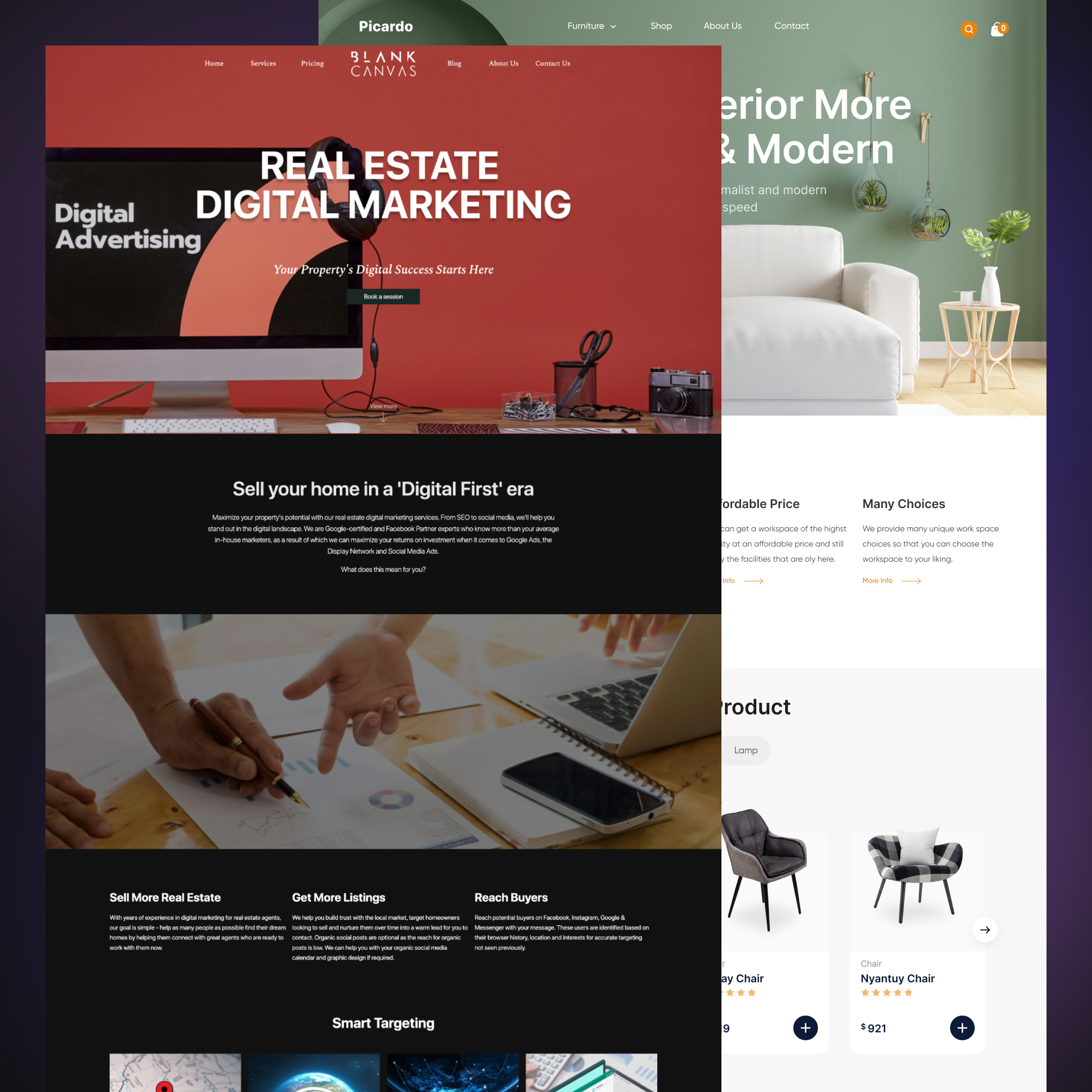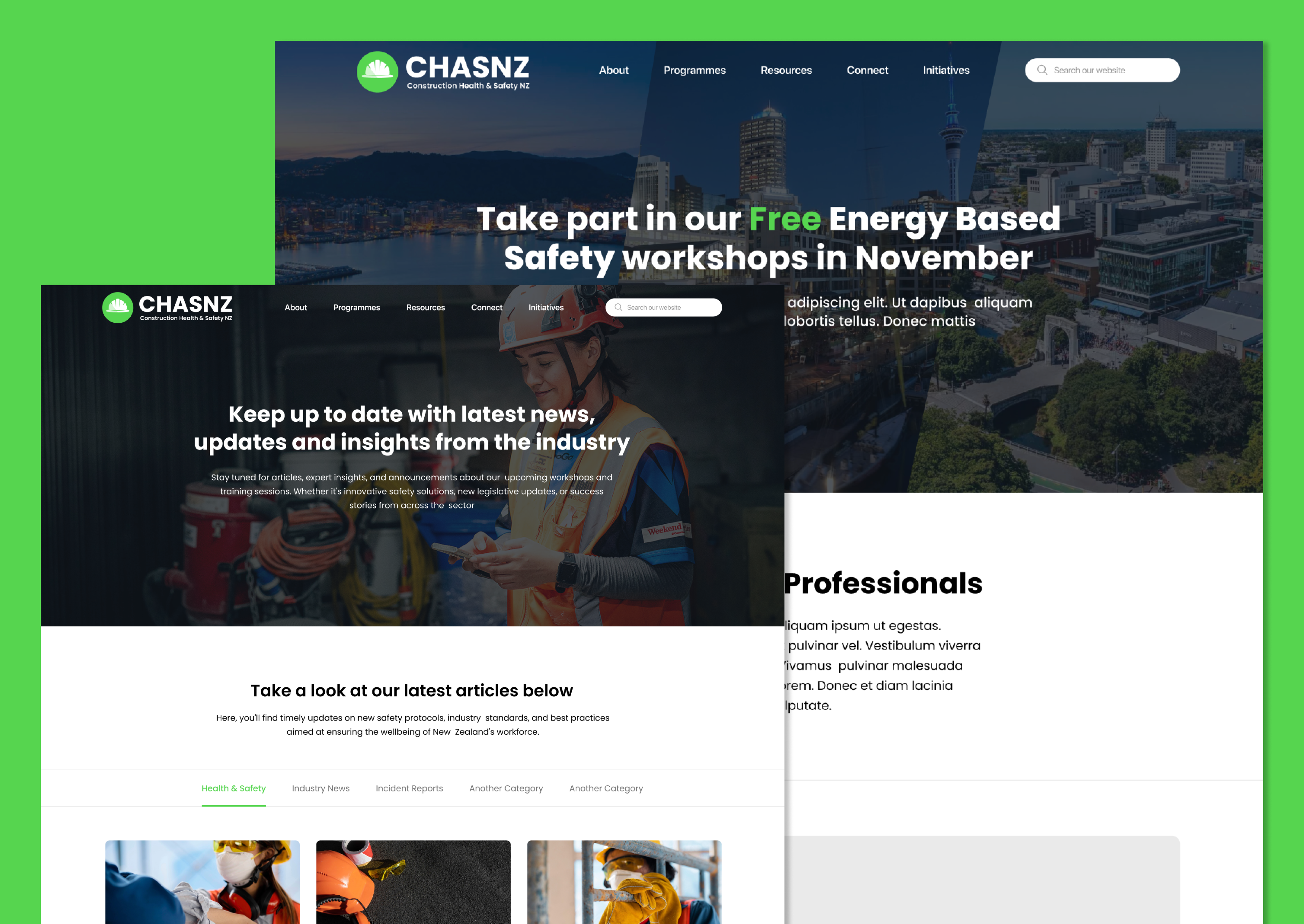How Much Does a Website Cost in 2025 in New Zealand?
Discover the true cost of building a website in New Zealand in 2025. Learn about website design packages, hidden costs, and tips for maximizing ROI with Builtflat’s expert web design services.

A well-designed website is no longer a luxury – it’s an essential business tool. Whether you’re a real estate photographer showcasing your portfolio, an accounting firm looking to attract new clients, or an ecommerce business scaling your online presence, your website serves as your digital storefront. But here’s the big question: How much does it cost to build a website in New Zealand in 2025? Spoiler alert – it depends on what you need.
From immersive web design services to bespoke website design for niche industries, website costs can vary significantly. Some businesses opt for affordable website design packages to keep things simple. Others prioritise custom web development services, including advanced integrations, SEO optimisation, and unique functionality. Your website’s final price tag boils down to your requirements, goals, and long-term vision.
In this guide, we’ll break down the true costs of building a website in New Zealand in 2025. You’ll find highly recommended actionable insights, industry-specific examples, and expert tips to make informed decisions about your website investment.
Why Do Businesses Need a Website?
The Role of a Website in Modern Business
Your website is more than just a collection of pages. It’s where first impressions are made, trust is built, and conversions happen with current and potential clients. A well-designed business website helps you stand out in competitive industries like construction, recruitment, ecommerce, and more. It works for you 24/7 – answering questions, providing information, and driving sales!
Benefits of a Professional Website
- Increased visibility: Reach more potential customers with a professional online presence. It’s known nowadays nearly 70-80% of consumers prefer online shopping for convenience, variety, and 24/7 availability.
- Enhanced trust: Considering up to 75% of users judge a company’s credibility based on its web design alone, having a sleek design builds credibility with your audience.
- Functionality that works for you: Whether you’re a law firm website or an transport agency your website can be customised to your needs.
- User Experience & User Interface Design: Working with a professional web agency means your website is backed by qualified designers experienced in creating visually appealing and highly usable sites for your clients.

DIY vs. Professional Web Design: Which Is Right for You?
DIY Websites
DIY website builders like WordPress, Wix, and Squarespace offer a tempting promise: build your website quickly and affordably. Packages start as low as $100–$500 per year.
But there’s a catch. Without experience, you may spend countless hours on setup, design, and troubleshooting. And advanced features, like ecommerce functionality or basic SEO services packages, often come at an extra cost.
Of course, we’re a bit biased – and for good reason. We’ve seen what happens in the long run. If you’re short on funds, a DIY website can be a good starting point, but only if you have the time to get the design right. We’ve worked with many businesses that tried the DIY route, only to find it hurt their credibility more than it helped.
Professional Web Design
If time is money, hiring a professional web developer in NZ might be the smarter choice. They handle the technical and creative aspects, from crafting bespoke website designs to optimising your site for search engines. While the cost is higher than a DIY builder, you’re paying for expertise, experience, and the time needed to create a site that truly represents your business.
Here’s a tip: not all professional agencies are the same although they say they deliver the same service. Some use closed source software, locking you into their services over open source software. Other’s use pre-built or template web designs over custom website designs crafted specifically for your customers. Make sure you know what you’re signing up for – not all “professional agencies” have your best interests in mind.

Types of Websites and Their Costs
Informational Websites
Ideal for small businesses, these sites include essential pages like Home, About, Services, and Contact.
- Cost Range: $2,000–$10,000+NZD
- Best For: Small businesses seeking affordable website design packages to get online and start growing. For example, accounting firms, plumbers, law firms, dentists, etc.
Corporate Websites
These websites are built to scale and often include dozens of pages, integrations with other software, and advanced navigation.
- Cost Range: $10,000–$30,000+NZD
- Best For: Established Larger businesses or B2B organisations wanting to work with a creative agency website design team to multiply their growth.
Ecommerce Websites
With features like shopping carts, payment gateways, and inventory systems, ecommerce website design agencies help you sell online seamlessly.
- Cost Range: $8,000–$50,000+NZD
- Best For: Businesses diving into ecommerce NZ markets or looking for tailored ecommerce web design agency solutions.
Database-Driven Websites
Built for advanced functionality like portals, booking systems, or SaaS platforms.
- Cost Range: $15,000–$50,000+NZD
- Best For: Companies requiring custom web development services.
It’s important to remember these prices are averages and can massively vary from project to project. We’ll try breaking down the influencing factors of website costs in the next section.
These prices are just averages and can vary a lot from project to project. In the next section, we’ll break down the factors that influence website costs.
Factors Influencing Website Design & Development Costs
Design Complexity and Functionality
The level of customisation in your website design significantly affects the cost. A simple template-based site is less expensive than one that requires custom coding or integrations. Features like booking systems, email marketing, calculators, or ecommerce online store tools add to the final price.
Custom website design
Custom website design takes time. Most projects take around 4 to 6 weeks to complete, which is roughly 160 to 240 hours of work. Larger projects can take 2 to 3 months, depending on the scope. How long it takes depends on the complexity of your idea, business needs, branding, design, and messaging.
Pro tip: Talk to your web agency about scalability. You don’t need to start with the biggest and most expensive website. Your site can grow with your business, letting you spread costs over time as your budget increases.
Template website design
You can save time and money with templates because the design work is already finished. You simply swap out the content and add your branding. While you can adjust templates by adding or removing features, these changes are often limited and can increase costs.
Keep in mind that templates are made for general use, not tailored to your business or clients. If it’s obvious you’re using a template, it could hurt your brand image and make your website feel less unique.
Want to find out if a custom or template website design suits your business? Read our article here or get in touch with the team!

Content Creation
High-quality content is essential for engaging users and improving search engine rankings. Professional marketing copywriting services can save you time and elevate your website’s messaging. Content creation costs vary depending on the number of pages, complexity, and whether professional photography, video or digital design services is needed.
SEO and Marketing Considerations
SEO and digital marketing are great ways to get your website in front of customers, but they do come at a cost.
SEO: What It Does
SEO helps your site rank higher on Google, so it appears when people search for the right keywords. Many business website design agencies provide basic SEO services packages, but for long-term success, businesses often invest in more advanced strategies. Here’s how SEO can help:
- Optimising keywords like “website design package NZ” and “web designers near me.”
- Creating landing pages tailored to ecommerce website design agencies.
- Writing blog posts on topics like “small business website cost” to attract organic traffic.
The Cost of SEO:
SEO pricing ranges from $500 to $5,000+ NZD per month, depending on the quality and time an agency dedicates to your project. While results take time to build, they last and grow with continued effort, making SEO one of the most cost-effective strategies for long-term ROI.
Digital Marketing:
Running ad’s on Google or Social Media platforms is an immediate tap flowing potential clients to your website. It works by creating an ad or multiple versions of an ad and setting targeting perimeters to your target audience. Here’s how Digital Marketing can help:
- Can instantly get in front of your target audience.
- Platform targeting can be very accurate.
- Great way to get your website to market quickly.
The Cost of Digital Marketing:
The costs for running ads on different platforms and different keywords vary, however you set the budget on how much you want to spend. Just remember, it’s important to optimise your ads as they run and once that budget runs out your ads will immediately turn off, and so will that flow of customers.

Hidden and Additional Costs
When budgeting for a website, it’s easy to overlook some ongoing expenses. These hidden costs can add up over time:
Domain Registration
Your domain name is your online address. Costs typically range from $10 to $130 annually, depending on the name’s Top Level Domain (TLD), popularity, and provider.
Web Hosting
Your hosting plan determines your website’s speed and uptime. There’s two main options: Shared hosting and dedicated.
Shared hosting means your website is hosted on a server with other sites, massively affecting the loading speed which can negatively impact your visibility online. These packages start at around $10-$30NZD per month.
Dedicated hosting means your website has it’s own dedicated server which only deals with the load from your site. These run a higher cost of $50-$250NZD per month but keep your website fast and ranking higher.
Generally there are hosting extra’s such as a CDN or monthly maintenance, so make sure to check with your provider!
SSL Certificates
SSL certificates ensure secure connections for users and are an essential part of website ownership. Don’t have one? Then you should expect less visitors to your site.
- Basic SSL: Free–$200NZD+ per year.
- Advanced SSL: $1,000NZD+ per year suitable for ecommerce NZ businesses handling sensitive transactions.
Maintenance and Updates
Professional website maintenance services include plugin updates, backups, and troubleshooting. This can also include additions or updates to content on your website, but you can also do this in house to save costs.
- Typical costs: $400–$10,000NZD per year.
Licensing Fees for Themes and Images
Using premium themes or stock images adds to costs. For example, a premium WordPress web development theme for a bespoke website design may cost $50–$200NZD+ upfront.
ROI and Long-Term Value of a Website
Calculating ROI
Your website should work as a lead generator and revenue driver. To measure its return on investment (ROI), consider:
- Customer Lifetime Value: How much is a single new customer worth to your business?
- Conversion Rates: How many visitors does it take to generate one sale?
For many businesses, it takes one to 5 new clients from an effective project to offset the initial design costs.
Scalability
A phased website release allows businesses to start small and expand as they grow. For instance:
- Phase 1: Launch a basic site with core pages and features using an affordable website design package.
- Phase 2: Add advanced features like ecommerce tools or custom integrations to external software.
Keeping Your Site Active
We see it all the time with businesses investing in a business website to end up leaving it and getting poor results. To get the most long-term value out of your website you need to keep it active and growing.
- Content: Add, edit and update all your visual content regularly.
- Blog: Creating new blog posts or resources keeps your website growing.
- Information: Do regular checks and updates to any important information.
- SEO: SEO is one of the best drivers of long-term success for any website.

Tips to Save Money on Website Costs
Prioritise Must-Have Features & Pages
Focus on the features that support your business goals, like booking tools for service businesses or product pages for ecommerce stores. To figure out what’s most important, check what your competitors and others in your industry are doing.
Opt for Phased Scalable Development
Launching your website in stages is a smart way to manage costs without sacrificing quality. This approach allows you to prioritise essential features first, such as basic pages (Home, About, Contact) or ecommerce functionality, and add more advanced features later as your business grows.
Maintain Clear Communication
Clear communication is essential to keep your website project on track. Start by setting clear goals and requirements before the design process begins. This ensures the web design team knows exactly what you need and avoids unnecessary back-and-forth, which can delay the project and increase costs.
Be upfront about your preferences and priorities but stay open to suggestions from your design team – they’re experts in creating effective, user-friendly websites. Regular check-ins and updates can also help ensure that everyone is aligned and that the project stays within scope and budget. And If possible, designate one person as the point of contact for your web designer.
Work With Professionals
Working with a professional website design service can actually save your business money in the long-term. Working with a reputable team with high quality designs, robust development knowledge and experience means you’re getting the best representation for your business. Avoiding dodgy dealers, poor brand credibility, lost sales and time.
Conclusion
Building a website in 2025 is one of the smartest investments your business can make. Whether you’re looking for affordable website design packages, bespoke website design, or advanced ecommerce solutions, the right website can transform how you connect with your audience and grow your business. From planning and design to maintenance and scalability, every decision you make should align with your business goals.
At Builtflat, we’re not just another web agency – we’re your partner in success. As a full-stack web agency in New Zealand, we specialise in custom web development services, business website design, and small business website design packages. Our team collaborates with you to create websites that work for your business, not against it. We’re here to ensure your site isn’t just functional but exceptional, delivering results that matter.
Ready to take your online presence to the next level? Get in touch with Builtflat today. Let’s build something incredible together!
Frequently Asked Questions
Below are some frequently asked questions relating to this blog post.